高中英语人教版(新课程标准)必修3 Unit 2 Healthy eating learning about Language(共46张PPT)
文档属性
| 名称 | 高中英语人教版(新课程标准)必修3 Unit 2 Healthy eating learning about Language(共46张PPT) | 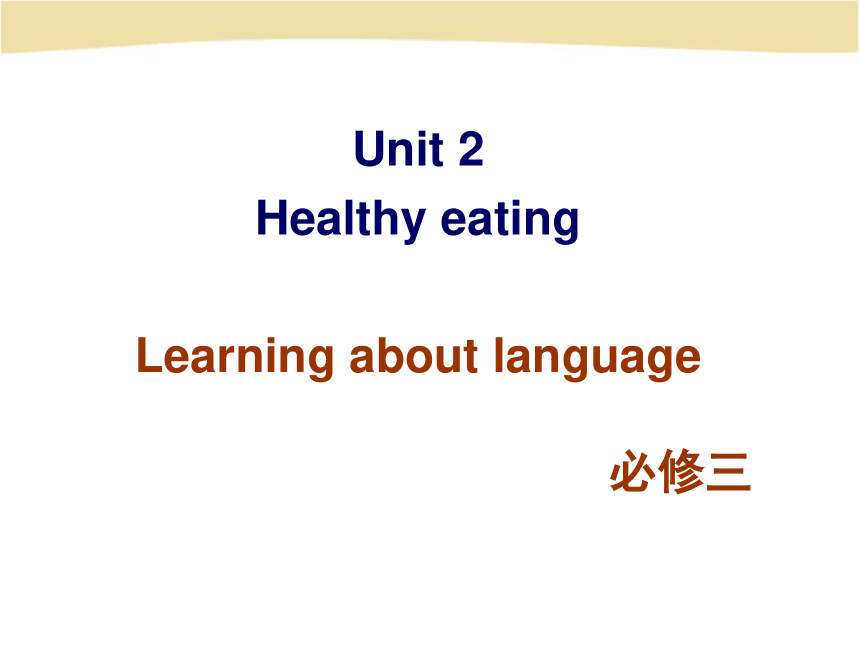 | |
| 格式 | zip | ||
| 文件大小 | 1.8MB | ||
| 资源类型 | 教案 | ||
| 版本资源 | 人教版(新课程标准) | ||
| 科目 | 英语 | ||
| 更新时间 | 2018-05-22 08:57:44 | ||
图片预览

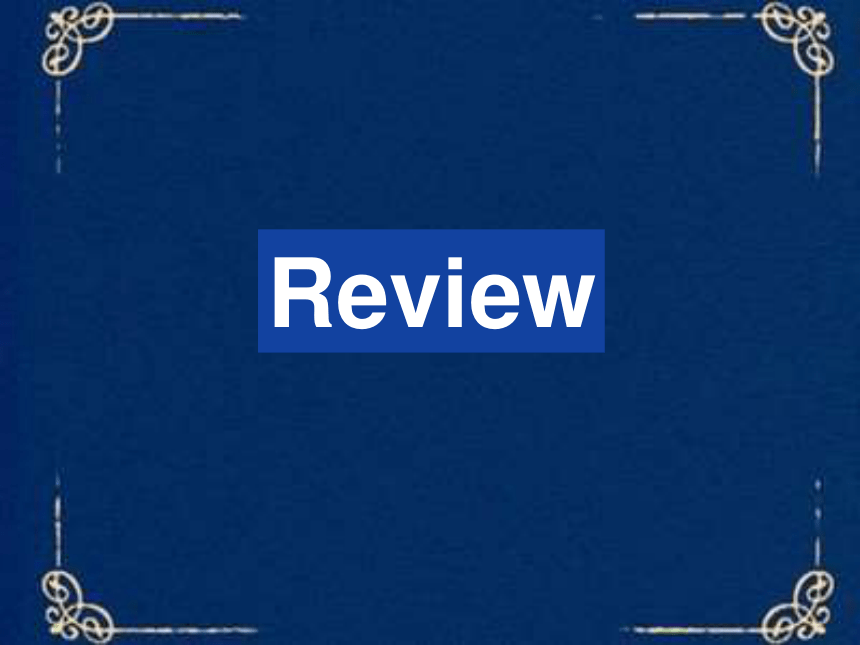
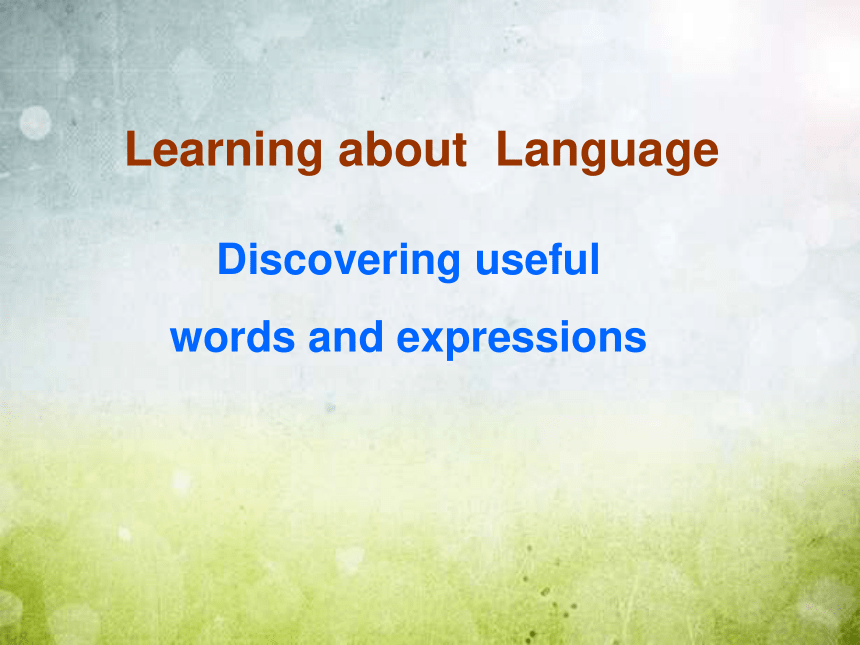
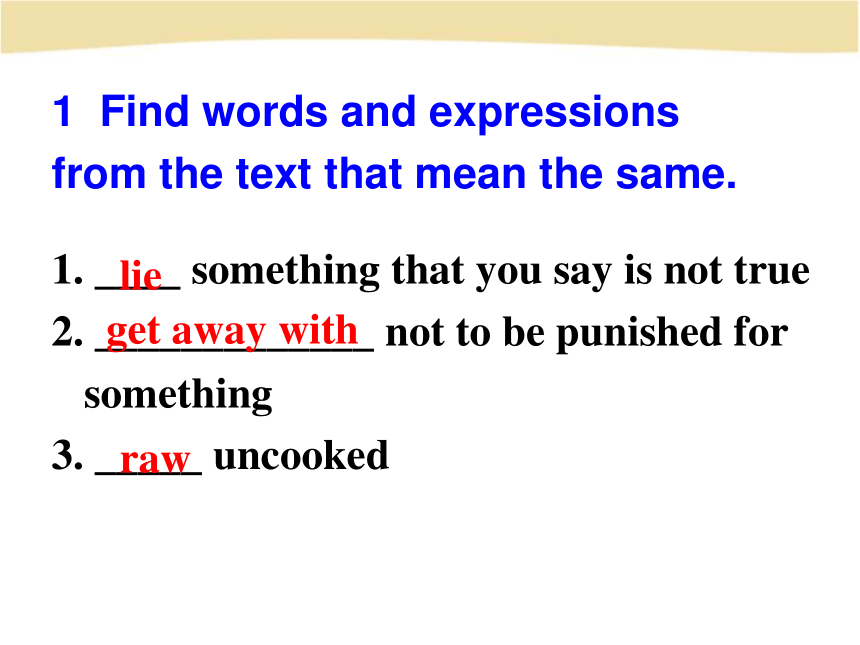
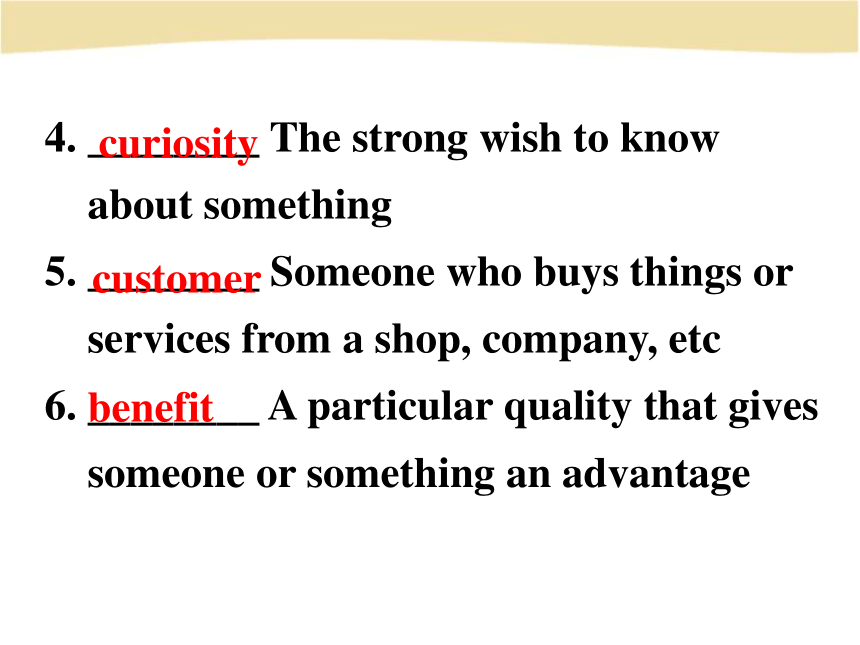
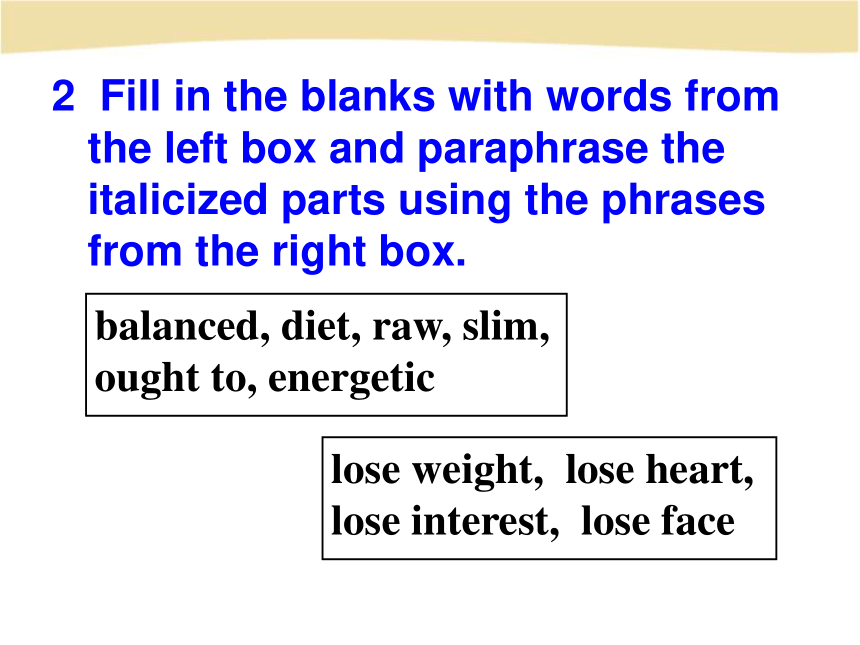
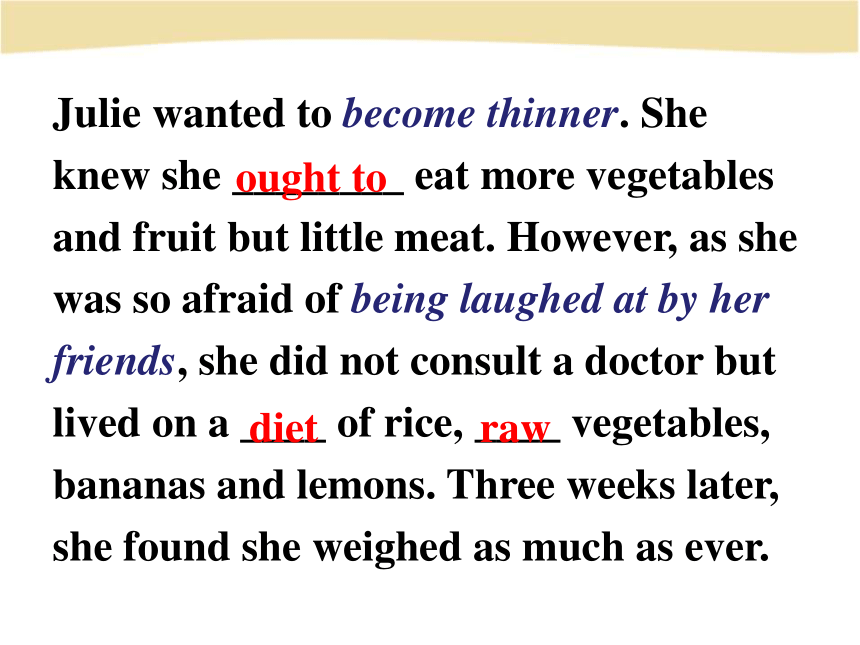
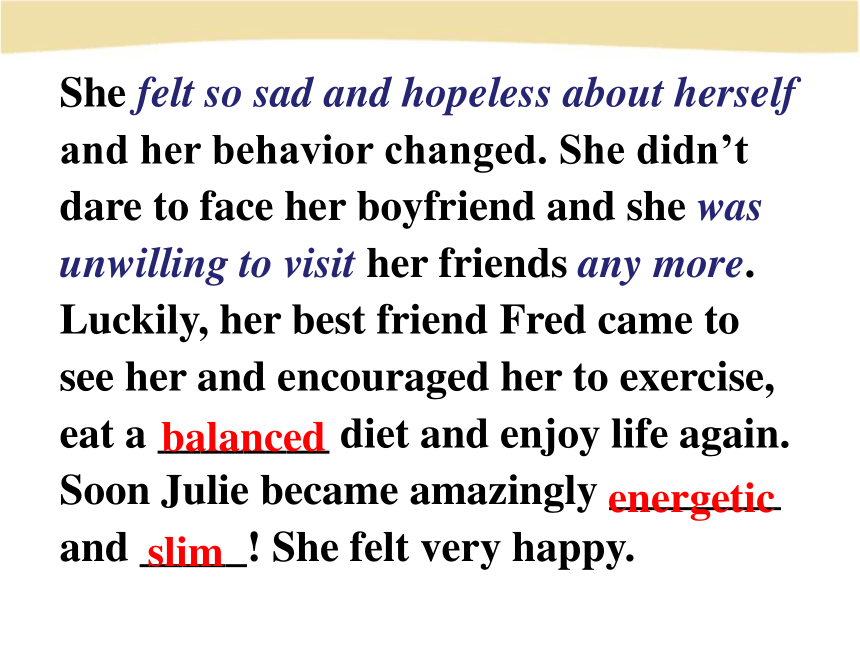
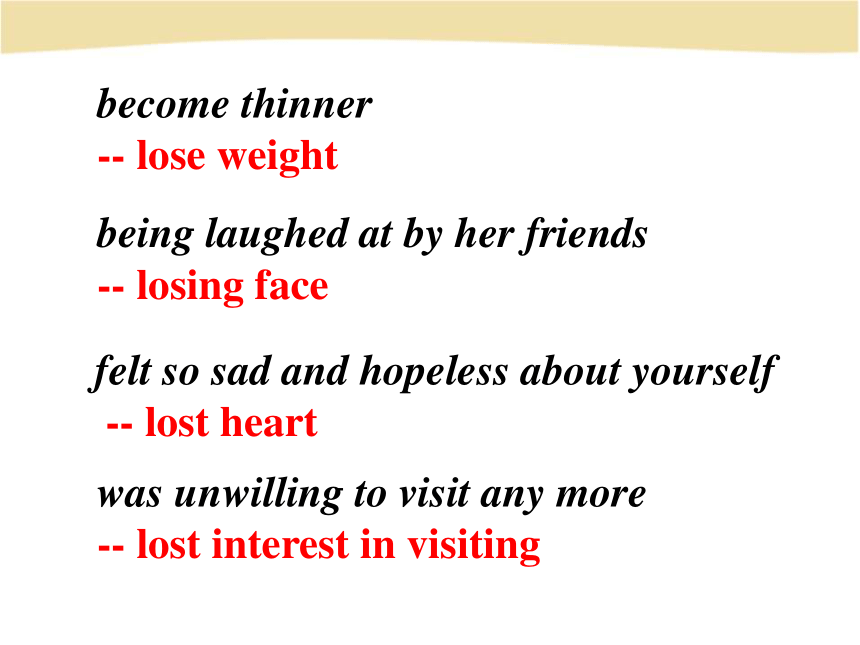
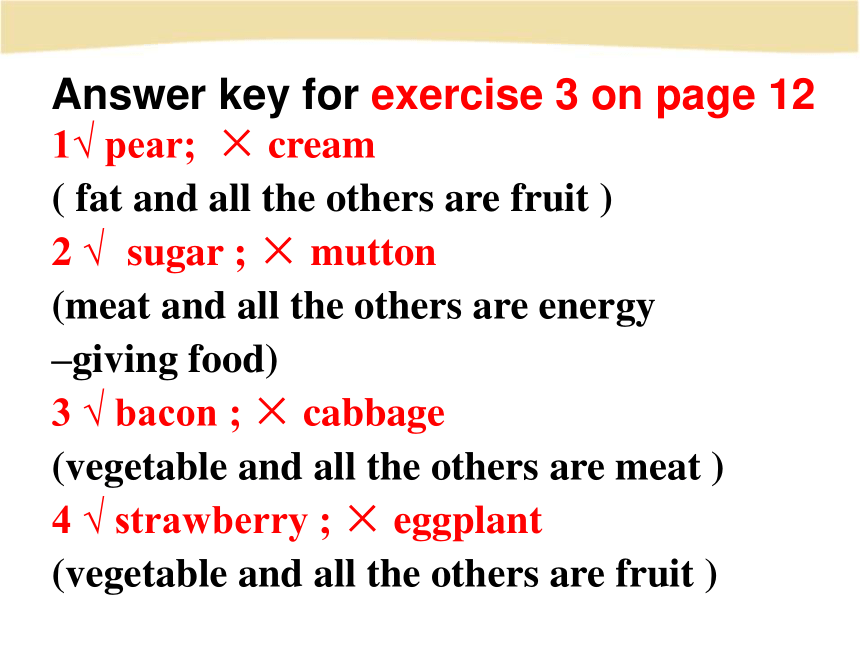
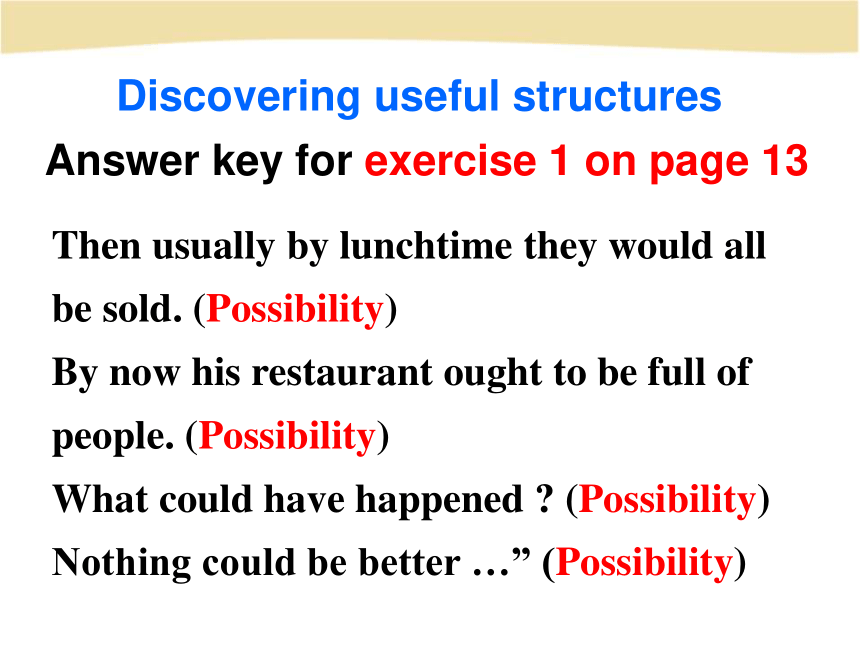
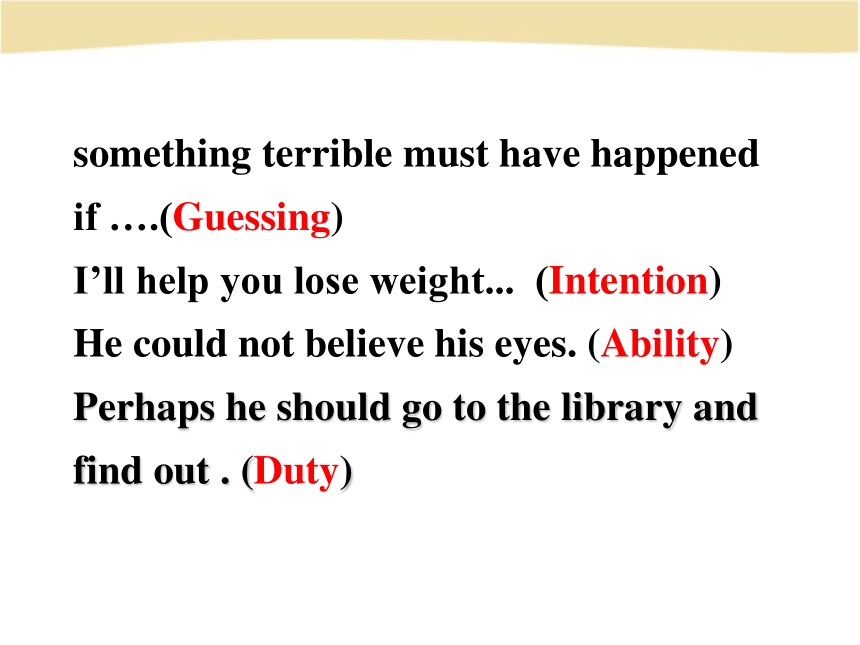
文档简介
(共46张PPT)
Unit 2
Healthy eating
Learning about language
必修三
Find words and expressions from the text that mean the same.
1. _____________take off weight
2. _____________a woman who invites guests
to a meal, a party, etc.
3. _____________
4. _____________an amount of money that is
taken off the usual cost of sth.
5. _____________recover something or
somebody that appears to be
lost
lose weight
hostess
thin, in a way that is attractive
slim
discount
win back
Review
Learning about Language
Discovering useful
words and expressions
____ something that you say is not true
2. _____________ not to be punished for
something
3. _____ uncooked
lie
get away with
raw
1 Find words and expressions
from the text that mean the same.
4. ________ The strong wish to know
about something
5. ________ Someone who buys things or
services from a shop, company, etc
6. ________ A particular quality that gives
someone or something an advantage
curiosity
customer
benefit
balanced, diet, raw, slim,
ought to, energetic
lose weight, lose heart,
lose interest, lose face
2 Fill in the blanks with words from
the left box and paraphrase the
italicized parts using the phrases
from the right box.
Julie wanted to become thinner. She knew she ________ eat more vegetables and fruit but little meat. However, as she was so afraid of being laughed at by her friends, she did not consult a doctor but lived on a ____ of rice, ____ vegetables, bananas and lemons. Three weeks later, she found she weighed as much as ever.
ought to
diet
raw
She felt so sad and hopeless about herself and her behavior changed. She didn’t dare to face her boyfriend and she was unwilling to visit her friends any more. Luckily, her best friend Fred came to see her and encouraged her to exercise, eat a ________ diet and enjoy life again. Soon Julie became amazingly ________ and _____! She felt very happy.
balanced
energetic
slim
become thinner
-- lose weight
being laughed at by her friends
-- losing face
felt so sad and hopeless about yourself
-- lost heart
was unwilling to visit any more
-- lost interest in visiting
1√ pear; × cream
( fat and all the others are fruit )
2 √ sugar ; × mutton
(meat and all the others are energy
–giving food)
3 √ bacon ; × cabbage
(vegetable and all the others are meat )
4 √ strawberry ; × eggplant
(vegetable and all the others are fruit )
Answer key for exercise 3 on page 12
Then usually by lunchtime they would all be sold. (Possibility)
By now his restaurant ought to be full of
people. (Possibility)
What could have happened (Possibility)
Nothing could be better …” (Possibility)
Discovering useful structures
Answer key for exercise 1 on page 13
something terrible must have happened if ….(Guessing)
I’ll help you lose weight... (Intention)
He could not believe his eyes. (Ability)
Perhaps he should go to the library and find out . (Duty)
He had better do some research ! (Duty)
Even though her customers might get thin after eating Yong Hui’s food ..(Possibility)
They would become tired very quickly (Intention)
…he could win his customers back (Ability )
1. SAM: How can I grow thinner, Mum
MUM: Well, you _______ eat food with
plenty of fibre that helps you
digest better. And you ________
stop drinking cola or eating
sweet food.
SAM: Does it mean I ________ eat my
favourite fried chicken any more
have to
should
shouldn’t
Answer key for exercise 2 on page 13
MUM: Not exactly, if you love fried
chicken, you ________ give it up.
Just eat it less often. You
____________________________
worry too much: a little fried
chicken _____ do you good!
needn’t
will
don’t have to /needn’t /shouldn’t
2. DOCTOR: You are sick because you’ve
eaten poisonous mushrooms.
Where did you get them
LUCY: I picked them in the forest. I
know we _______ eat fresh
vegetables.
DOCTOR: Oh, but you ________ eat
them until you’re sure they
are not poisonous.
LUCY: Thank you, doctor. I’ll be
more careful next time.
have to
mustn’t
3. CHARLES: I wish I could see things
clearly in the dark.
TOM: Eating carrots ________
help you see better. You
_______ eat some every
day.
ought to
should
Grammar
Modal verbs
should 和ought to 都为“应该”的意思,
可用于各种人称。ought to 的语气
稍重一些。
他们想必已到那儿了。
They ought to be there by now.
他最好不要抽烟了。
He ought to stop smoking.
1. ought to/should
should表示主语的义务或责任:
You should take care of your sister.
你应当去照顾你妹妹。
或指出一个正确、明智的动作:
They shouldn’t allow parking here;
the street is too narrow.
这儿不该允许停车; 马路太窄了。
ought to意思是“应该”,是情态动词,只有一种形式,后边接动词不定式,to不能省略。ought to没有人称和数的变化,后接动词原形可以表示现在、将来或过去将来,由时间状语或上下文决定。They ought to come tomorrow.
He thought that they ought to take part in the design.
ought的否定形式由直接加not构成,疑问式将ought提到句首构成。
He ought not to do it.
= He oughtn’t to do it. Ought we to do it at once 在反意疑问句里,下面两种形式都可以: He ought to be here, shouldn’t he He ought to be here, oughtn’t he
should 和ought to后面跟动词不定式的
完成式, 其肯定句表示 “过去应该做而未做”,
其否定句则表示 “过去不该做但做了”。
You should/ought to have made the decision
a week ago.
I shouldn't have made such a foolish mistake.
多数情况下, ought to 可与should互换使用。
ought to的反意疑问句用shouldn’t替代。
注意
三者均表示建议, 意为“应该”, “应当”或
“最好做……”。三者的语气程度为渐强。
had better 指一般性的建议, 最弱。
should&ought to 含义相近, 常可互换。
区别在于, ought to 常指特殊情况下的
“应当”。Should 则指一般情况。如:
had better, should & ought to
Shall 用于第一, 三人称的疑问句中, 表征求
意见或请求;
用于第二, 三人称的陈述句中,表命令,警告,
允诺, 威胁等;
should 表劝告, 建议, 命令, 顺理成章的,
和ought to一样。
疑问句中常用should代替ought to。
ought to 表应该, 语气比should强。
shall, should &ought to
You ought to help him because he is in trouble now. (语气强, 有命令意味)
You should have a rest after finishing your sports. (一般性建议)
You ought to call the police when you find something wrong in your house.
He should take care of the babies tonight.
have to 表示客观需要去做的事情,
意为“必须, 不得不” 。
I have to get the station early to catch
the first train.
We missed the bus so we had to walk home.
We have to overcome all kinds of
difficulties.
2. have to
have to 有多种时态:
We will have to gather at the school gate
at 7 tomorrow. 一般将来时
I have to take more money with me
because my girlfriend has so much to buy.
一般现在时
Finally, we had to give up our idea to
hold a picnic outside as it rained for a
whole afternoon. 一般过去时
--Must they do their homework now
--Yes, they must.
--No, they needn’t/don’t have to.
must用于疑问句询问对方是否认为主语
必须做某事; 肯定回答可以用must, 否定
回答不能用mustn’t, 常用don’t have to
或 needn’t。
must have to
主观/客观 主观 客观
时态 现在, 将来 多种
表推测 √ ×
询问意愿 √ ×
否定意思 禁止, 不允许 不必
must & have to
need和dare既可用作情态动词,也可用作实义动词。用作情态动词时,主要用于否定句和疑问句。用作实义动词时,可用于各种句式。
1. 用作情态动词
You needn’t telephone him now.
I don’t think you need worry.
She dare not go out alone at night.
How dare you say I’m unfair
dare & need
2. 用作实义动词
You don’t need to do it yourself.
We need to tell them the news.
We should dare to give our own opinion.
He did not dare (to) look up.
I dare say he’ll come again.
(I dare say…为固定习语)
注意对need问句的回答:
--Need I finish the work today
--Yes, ________________.
No, ________________.
No, ________________.
you must
you needn’t
you don’t have to
needn’t 对其它情态动词的回答:
--Shall I tell John about it
--No, you __________.
--No, you _____________.
--Must we do it now
--No, you __________.
--No, you ______________.
needn’t
don’t have to
needn’t
don’t have to
用下列图片造句。
做适当的运动
You should do some sports.
慢慢地进食, 并有助消化。
You ought to eat slowly and it’s good for digestion.
You should help to set the dinner table.
You should keep your room clean.
We must listen to the teacher carefully.
You shouldn’t be late for school.
We should ask question actively.
1. You ____ your tooth pulled out before it rot completely. A. had better got B. had to get better
C. had better to get D. had better get
D
2. When we got to the cinema, the film hasn’t started yet, so we ____. A. needn’t hurry
B. didn’t need hurry
C. needn’t to hurry
D. needn’t have hurried 3. It was really very dangerous; you ____ him seriously. A. might have injured B. could injure
C. should have injured D. must injure
D
A
4. As he had heart attack, he was told that he ____ continue the work.
A. needn’t B. may not
C. mustn’t D. can't
5. We ought to help each other in our
work, ____
A. oughtn’t we B. should we
C. shouldn't we D. ought to we
6. Two eyes ____see more than one.
A. can B. may C. will D. should
A
A
C
Homework
1. Preview the reading (2) and see how
the story ended.
2. Finish the exercises on Page 49-50.
Unit 2
Healthy eating
Learning about language
必修三
Find words and expressions from the text that mean the same.
1. _____________take off weight
2. _____________a woman who invites guests
to a meal, a party, etc.
3. _____________
4. _____________an amount of money that is
taken off the usual cost of sth.
5. _____________recover something or
somebody that appears to be
lost
lose weight
hostess
thin, in a way that is attractive
slim
discount
win back
Review
Learning about Language
Discovering useful
words and expressions
____ something that you say is not true
2. _____________ not to be punished for
something
3. _____ uncooked
lie
get away with
raw
1 Find words and expressions
from the text that mean the same.
4. ________ The strong wish to know
about something
5. ________ Someone who buys things or
services from a shop, company, etc
6. ________ A particular quality that gives
someone or something an advantage
curiosity
customer
benefit
balanced, diet, raw, slim,
ought to, energetic
lose weight, lose heart,
lose interest, lose face
2 Fill in the blanks with words from
the left box and paraphrase the
italicized parts using the phrases
from the right box.
Julie wanted to become thinner. She knew she ________ eat more vegetables and fruit but little meat. However, as she was so afraid of being laughed at by her friends, she did not consult a doctor but lived on a ____ of rice, ____ vegetables, bananas and lemons. Three weeks later, she found she weighed as much as ever.
ought to
diet
raw
She felt so sad and hopeless about herself and her behavior changed. She didn’t dare to face her boyfriend and she was unwilling to visit her friends any more. Luckily, her best friend Fred came to see her and encouraged her to exercise, eat a ________ diet and enjoy life again. Soon Julie became amazingly ________ and _____! She felt very happy.
balanced
energetic
slim
become thinner
-- lose weight
being laughed at by her friends
-- losing face
felt so sad and hopeless about yourself
-- lost heart
was unwilling to visit any more
-- lost interest in visiting
1√ pear; × cream
( fat and all the others are fruit )
2 √ sugar ; × mutton
(meat and all the others are energy
–giving food)
3 √ bacon ; × cabbage
(vegetable and all the others are meat )
4 √ strawberry ; × eggplant
(vegetable and all the others are fruit )
Answer key for exercise 3 on page 12
Then usually by lunchtime they would all be sold. (Possibility)
By now his restaurant ought to be full of
people. (Possibility)
What could have happened (Possibility)
Nothing could be better …” (Possibility)
Discovering useful structures
Answer key for exercise 1 on page 13
something terrible must have happened if ….(Guessing)
I’ll help you lose weight... (Intention)
He could not believe his eyes. (Ability)
Perhaps he should go to the library and find out . (Duty)
He had better do some research ! (Duty)
Even though her customers might get thin after eating Yong Hui’s food ..(Possibility)
They would become tired very quickly (Intention)
…he could win his customers back (Ability )
1. SAM: How can I grow thinner, Mum
MUM: Well, you _______ eat food with
plenty of fibre that helps you
digest better. And you ________
stop drinking cola or eating
sweet food.
SAM: Does it mean I ________ eat my
favourite fried chicken any more
have to
should
shouldn’t
Answer key for exercise 2 on page 13
MUM: Not exactly, if you love fried
chicken, you ________ give it up.
Just eat it less often. You
____________________________
worry too much: a little fried
chicken _____ do you good!
needn’t
will
don’t have to /needn’t /shouldn’t
2. DOCTOR: You are sick because you’ve
eaten poisonous mushrooms.
Where did you get them
LUCY: I picked them in the forest. I
know we _______ eat fresh
vegetables.
DOCTOR: Oh, but you ________ eat
them until you’re sure they
are not poisonous.
LUCY: Thank you, doctor. I’ll be
more careful next time.
have to
mustn’t
3. CHARLES: I wish I could see things
clearly in the dark.
TOM: Eating carrots ________
help you see better. You
_______ eat some every
day.
ought to
should
Grammar
Modal verbs
should 和ought to 都为“应该”的意思,
可用于各种人称。ought to 的语气
稍重一些。
他们想必已到那儿了。
They ought to be there by now.
他最好不要抽烟了。
He ought to stop smoking.
1. ought to/should
should表示主语的义务或责任:
You should take care of your sister.
你应当去照顾你妹妹。
或指出一个正确、明智的动作:
They shouldn’t allow parking here;
the street is too narrow.
这儿不该允许停车; 马路太窄了。
ought to意思是“应该”,是情态动词,只有一种形式,后边接动词不定式,to不能省略。ought to没有人称和数的变化,后接动词原形可以表示现在、将来或过去将来,由时间状语或上下文决定。They ought to come tomorrow.
He thought that they ought to take part in the design.
ought的否定形式由直接加not构成,疑问式将ought提到句首构成。
He ought not to do it.
= He oughtn’t to do it. Ought we to do it at once 在反意疑问句里,下面两种形式都可以: He ought to be here, shouldn’t he He ought to be here, oughtn’t he
should 和ought to后面跟动词不定式的
完成式, 其肯定句表示 “过去应该做而未做”,
其否定句则表示 “过去不该做但做了”。
You should/ought to have made the decision
a week ago.
I shouldn't have made such a foolish mistake.
多数情况下, ought to 可与should互换使用。
ought to的反意疑问句用shouldn’t替代。
注意
三者均表示建议, 意为“应该”, “应当”或
“最好做……”。三者的语气程度为渐强。
had better 指一般性的建议, 最弱。
should&ought to 含义相近, 常可互换。
区别在于, ought to 常指特殊情况下的
“应当”。Should 则指一般情况。如:
had better, should & ought to
Shall 用于第一, 三人称的疑问句中, 表征求
意见或请求;
用于第二, 三人称的陈述句中,表命令,警告,
允诺, 威胁等;
should 表劝告, 建议, 命令, 顺理成章的,
和ought to一样。
疑问句中常用should代替ought to。
ought to 表应该, 语气比should强。
shall, should &ought to
You ought to help him because he is in trouble now. (语气强, 有命令意味)
You should have a rest after finishing your sports. (一般性建议)
You ought to call the police when you find something wrong in your house.
He should take care of the babies tonight.
have to 表示客观需要去做的事情,
意为“必须, 不得不” 。
I have to get the station early to catch
the first train.
We missed the bus so we had to walk home.
We have to overcome all kinds of
difficulties.
2. have to
have to 有多种时态:
We will have to gather at the school gate
at 7 tomorrow. 一般将来时
I have to take more money with me
because my girlfriend has so much to buy.
一般现在时
Finally, we had to give up our idea to
hold a picnic outside as it rained for a
whole afternoon. 一般过去时
--Must they do their homework now
--Yes, they must.
--No, they needn’t/don’t have to.
must用于疑问句询问对方是否认为主语
必须做某事; 肯定回答可以用must, 否定
回答不能用mustn’t, 常用don’t have to
或 needn’t。
must have to
主观/客观 主观 客观
时态 现在, 将来 多种
表推测 √ ×
询问意愿 √ ×
否定意思 禁止, 不允许 不必
must & have to
need和dare既可用作情态动词,也可用作实义动词。用作情态动词时,主要用于否定句和疑问句。用作实义动词时,可用于各种句式。
1. 用作情态动词
You needn’t telephone him now.
I don’t think you need worry.
She dare not go out alone at night.
How dare you say I’m unfair
dare & need
2. 用作实义动词
You don’t need to do it yourself.
We need to tell them the news.
We should dare to give our own opinion.
He did not dare (to) look up.
I dare say he’ll come again.
(I dare say…为固定习语)
注意对need问句的回答:
--Need I finish the work today
--Yes, ________________.
No, ________________.
No, ________________.
you must
you needn’t
you don’t have to
needn’t 对其它情态动词的回答:
--Shall I tell John about it
--No, you __________.
--No, you _____________.
--Must we do it now
--No, you __________.
--No, you ______________.
needn’t
don’t have to
needn’t
don’t have to
用下列图片造句。
做适当的运动
You should do some sports.
慢慢地进食, 并有助消化。
You ought to eat slowly and it’s good for digestion.
You should help to set the dinner table.
You should keep your room clean.
We must listen to the teacher carefully.
You shouldn’t be late for school.
We should ask question actively.
1. You ____ your tooth pulled out before it rot completely. A. had better got B. had to get better
C. had better to get D. had better get
D
2. When we got to the cinema, the film hasn’t started yet, so we ____. A. needn’t hurry
B. didn’t need hurry
C. needn’t to hurry
D. needn’t have hurried 3. It was really very dangerous; you ____ him seriously. A. might have injured B. could injure
C. should have injured D. must injure
D
A
4. As he had heart attack, he was told that he ____ continue the work.
A. needn’t B. may not
C. mustn’t D. can't
5. We ought to help each other in our
work, ____
A. oughtn’t we B. should we
C. shouldn't we D. ought to we
6. Two eyes ____see more than one.
A. can B. may C. will D. should
A
A
C
Homework
1. Preview the reading (2) and see how
the story ended.
2. Finish the exercises on Page 49-50.
同课章节目录
